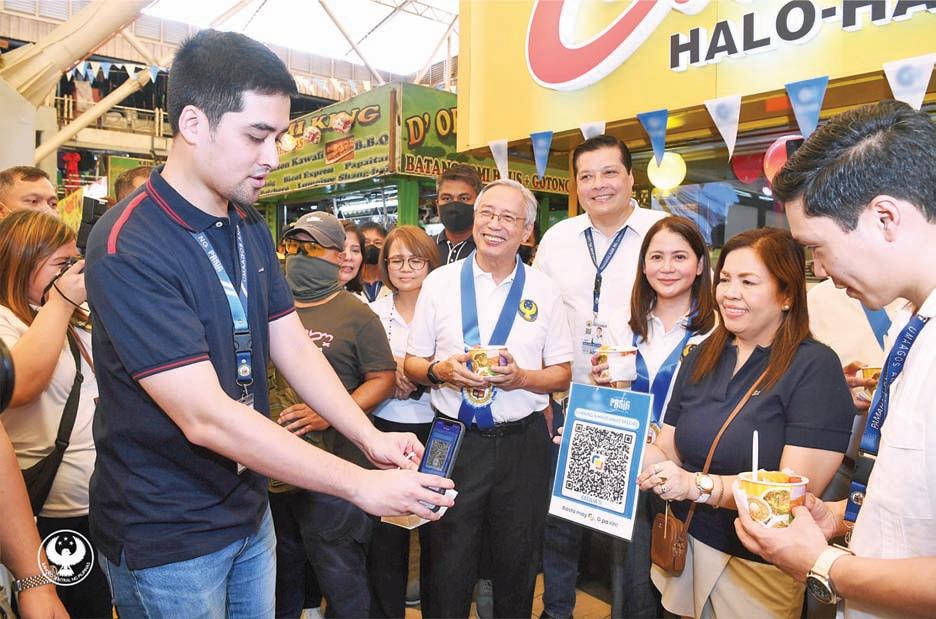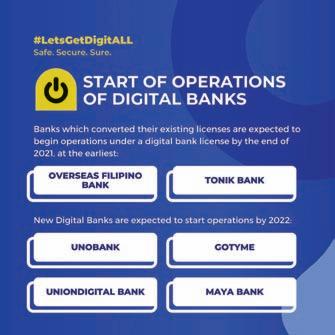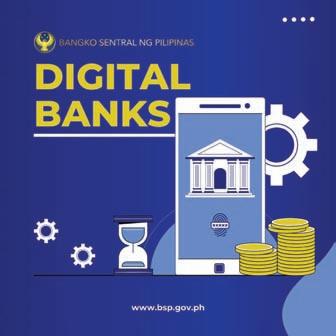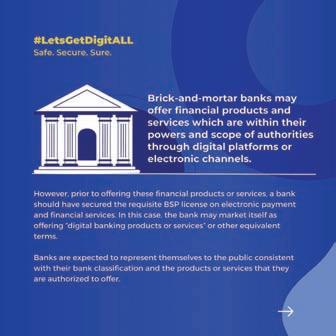
2 minute read
A FUTURE-READY PHILIPPINES: DIGITAL, SUSTAINABLE, INCLUSIVE Revolutionizing the payments and settlements system The BSP’s journey toward financial digitalization
Pasig City Mega Market have joined the program, which provides a safe and convenient alternative to cash payments. Paleng-QR Ph Plus is consistent with the #BSP’s goal to convert half of retail payments volume into digital form and onboard 70 percent of Filipino adults onto the formal financial system by this year. Governor Medalla said the BSP is working with banks to cut or waive digital transfer fees to boost digitalization: “Ang dream namin sa central bank, ‘yung small transactions, walang fees.” Mayor Sotto echoed Governor Medalla’s statement, saying “Napakaganda po ng panukala sa atin ng BSP Governor. Kaya gusto po natin na mas gamitin pa ng vendors [ang QR Ph].” Also in the photo are (from right) Pasig City Councilor Simon Romulo Tantoco, Cecilia Valencia of Charing’s Halo-Halo Special, BSP Deputy Governor Bernadette Romulo-Puyat, and Pasig City Vice Mayor Robert Vincent Jude “Dodot” Jaworski Jr.
Transformation Roadmap (DPTR) for 2020-2023. Under this threeyear blueprint, the BSP aims to see half of the retail transactions in the country done electronically and at least 70 percent of Filipino adults owning transaction accounts, including e-wallets, by the end of 2023. The twin goals are well within reach. Latest BSP data show that in 2021, about 30.3 percent of financial transactions were done electronically, and 56 percent of Filipino adults had transaction accounts, up from 14.0 percent and 29.0 percent, respectively, only one year ago before the COVID-19 pandemic hit.
Making
payments efficient, safe, and inclusive
The digitalization trend comes amid the BSP’s efforts to pursue a payments and settlements system that is efficient, safe, and inclusive. On efficiency, the BSP has rolled out initiatives that make electronic fund transfers easy. An example is the establishment of the two interoperable clearinghouses PESONet [Philippine EFT (Electronic Fund Transfer) System and Operations Network] and InstaPay. Through these platforms, a person may electronically transfer funds to an intended recipient even if their accounts are lodged with different banks or e-wallets.
The Monetary Board has approved licenses for six digital banks, which is expected to support the digitalization and financial inclusion goals of the Bangko Sentral ng Pilipinas. A digital bank has NO PHYSICAL BRANCH, SUB-BRANCH or BRANCH-LITE UNITS. It offers financial products and services that are processed end-to-end through a digital platform or electronic channel.



National Payments and Systems Act (Republic Act No. 11127) in 2018. The act mandated the BSP to oversee payment systems in the country and exercise supervisory powers for the purpose of ensuring the stability and effectiveness of the monetary and financial system.
A year after, this function was then institutionalized through the enactment of the amended BSP charter (Republic Act No. 11211).
The law explicitly states that “the Bangko Sentral shall oversee the payment and settlement systems in the Philippines, including critical financial market infrastructures, in order to promote sound and prudent practices consistent with the maintenance of financial stability.”

With its institutionalized role, the BSP established the Payments and Currency Management Sector (PCMS) in 2021 to lead the Bank’s supervisory work in this area.
The BSP, through the PCMS, pioneered innovative strategies in the digitalization of payments and accelerated the operationalization of the Digital Payments
Another example is the creation of digital payment streams EGov Pay and QR Ph. The EGov Pay is an electronic payment facility that allows individuals and businesses to digitally pay taxes, licenses, permits, and other obligations to the government. QR Ph, the national QR (quick response) code standard, provides an interoperable platform that allows QR-enabled fund transfers even if the sender Turn to










